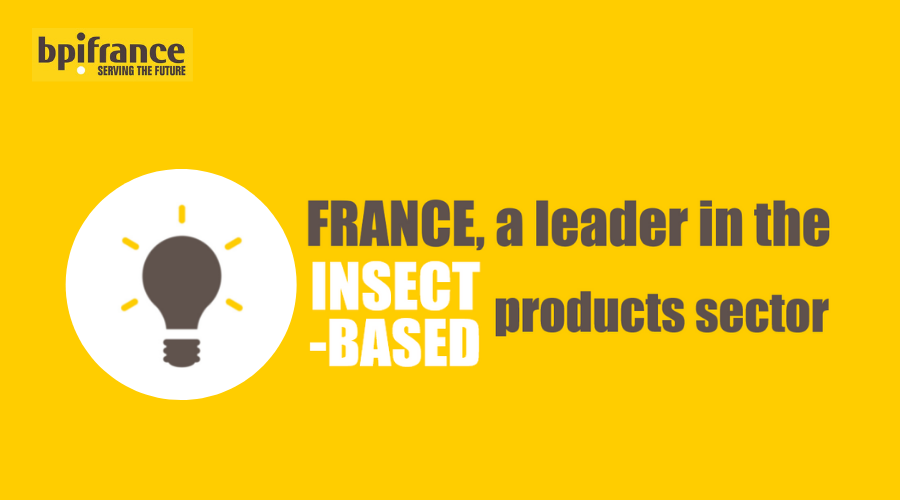How France Is Leading The Way In Insect Protein Production
Insect-based products are emerging as a potential solution to answer the global demand for alternative and more sustainable forms of dietary protein. France is well positioned to tackle the challenge, with innovative and ambitious companies already leading in the production of insect-based feed for animal and plant nutrition. As the global population increases and eating…

Insect-based products are emerging as a potential solution to answer the global demand for alternative and more sustainable forms of dietary protein. France is well positioned to tackle the challenge, with innovative and ambitious companies already leading in the production of insect-based feed for animal and plant nutrition.
As the global population increases and eating habits evolve in developed countries, protein production is set to become a major challenge for our food system. But among the recent solutions that have emerged to develop alternative proteins (from using microalgae to methods relying on cell cultures), there is one that has crawled into the picture: insect-based food products.
A sustainable and reliable source of protein, insects are touted by some as the key to answer the growing needs for proteins, with a market estimated at 30 million tons in 2030. Europe, which currently imports 70% of its proteins, is working on addressing the issue: In early 2021, the European Union voted to approve the first-insect derived food product (mealworms) for human consumption. It is a landmark decision that opens a whole new market for companies already producing insect-based food for animal and plant nutrition.
Within this shifting regulatory and resources landscape, France is well positioned to become a global leader in this new industry, boasting innovative companies at the forefront of the market — several with broad ambitions and the means to expand internationally.
A focus on innovation
French companies Ÿnsect and InnovaFeed both breed and process insects into premium ingredients: the Buffalo and Molitor mealworms for Ÿnsect and the Hermetia Illucens for InnovaFeed. Their products range from proteins for animal feed to organic fertilizer for agriculture.
Ÿnsect was founded in 2011, and now is driven by the mission “to reinvent the global agrifood system.” Cofounder Jean-Gabriel Levon explains that the company is convinced that the new paradigm will be largely built with “vertical farms.” Ÿnsect is currently building Ÿnfarm, projected to be the largest insect farm in the world: With four 36-meter high towers, the site in northern France will boast an annual production capacity of 100,000 tons when operations start in 2022 — with plans to double output in successive years.
“One of the reasons insect production didn’t really exist before is that we were lacking the technology and automatization needed for this type of factory,” says Levon. “Today, we can rely on a Industry 4.0 production line and use data to manage the different areas of the farm.”
Fully automated and using vertical farming techniques to save energy and space, the facility will also feature data sensors which will enable Ÿnsect teams to monitor insect productivity and growth.
InnovaFeed is also relying on cutting-edge technology in its vertical farm, inaugurated at the end of 2020 in Nesle in northern France, currently the biggest active insect farm in the world.
“We have developed disruptive technology to optimize the production cycle of insects, by combining robotics and artificial intelligence,” explains Clément Ray, cofounder of InnovaFeed.
More than 3,000 sensors are spread over the entire site for real-time collection of the data necessary for optimizing breeding conditions (temperature, humidity, density, brightness, etc.). The farm is also based on a zero-waste, circular production model, using agricultural co-products collected locally to feed its insects. The company plans to go one step further in the innovation process by building a global R&D site.
Ambitions to expand globally
Both companies are looking beyond the borders of France to expand their activities. “The opening of our new farm in 2022 will mark the first phase of deployment of our technology across the world,” says Ÿnsect’s Levon. “We are done with the scaling up phase of our technology — now we need to scale up commercially, by establishing ourselves in other countries, basically anywhere we can get food resources for our insects.”
Ÿnsect currently operates two sites in France and the Netherlands and owns an office in Miami, U.S., where the company is eyeing potential expansion, while also exploring possibilities in Southeast Asia.
InnovaFeed is planning to open 10 new production sites by 2030, both in France and abroad. The company recently signed a strategic partnership with American agribusiness ADM to build a new vertical farm next to the world’s largest corn production site in Decatur, Illinois.
Clément Ray explains that InnovaFeed is betting on signing long-term partnerships with local actors to export its technology abroad. “These partnerships generate significant synergies, both economically, logistically and environmentally speaking,” he says.
The dynamism and ambitions of both companies, relying on advanced technology and a strong agricultural sector, are just two examples of France’s head start in the insect protein production sector. Now that the EU has given its green light for the first insect-based food product for human consumption, both are busy already anticipating this new market opportunity: Ÿnsect is working on ŸnMeal, a defatted protein ingredient adapted to human consumption; InnovaFeed is conducting research on the development of day-to-day products such as energy bars for athletes and grocery products like meat substitutes. Consider it the next generation of French cuisine.
Related
Trending

